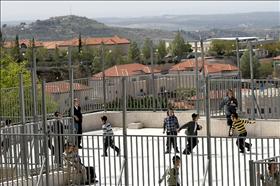Sharing the burden in education
Core Curriculum is the key to success for the ultra-Orthodox sector
While army service is necessary for properly integrating the ultra-Orthodox sector into Israeli society, the real path to success lies in giving yeshiva students the educational tools to succeed in the Israeli workforce.
05/08/2013 14:49
Tags: Core curriculum · Haredi edcuation · Adina Bar-Shalom · equality in sharing the burden

Haredi school children in Beitar Illit playing on the roof of the school. 22.03.2010. Photo: Nati Shohat, Flash 90
The Haredi enlistment issue is one of the main factors that create significant cultural and economic gaps in Israeli society, but it is not the only one. The government must similarly tackle another major obstacle to success and sustainability in the ultra-Orthodox sector: education. There is an overwhelmingly high dropout rate of Haredi students from higher education and disproportionately low amount of representation of the ultra-Orthodox sector in the workforce. The education gaps between ultra-Orthodox schools and the rest of the Jewish schools systems in the country prevent students from succeeding in Israeli society, stunt the economy's potential growth, and damage the country's social fabric.
The problem with Israel's ultra-Orthodox education starts with the basics. In most state-funded schools in the ultra-Orthodox school sector, students do not study the subjects that are necessary in order to succeed in Israel's job market. Mathematics, science, history, and foreign languages are not taught in ultra-Orthodox classrooms in Israel. This is largely because of the political status quo, which has provided these men a publicly-financed livelihood of studying Torah. Students are virtually unable to enter any other job market besides professional Talmud study, a lifestyle that creates a population dependent on state welfare and causes a burden to Israel's economy.
Though this disparaging reality might seem irresponsible to the common onlooker, it troubles very few in the ultra-Orthodox sector. MK Moshe Gafni (United Torah Judaism) claims that because of their intensive religious studies, yeshiva students are more capable to quickly learn a profession. "[The yeshiva student's] head is always working. He's constantly training and there's no profession as intellectually sharpening as the yeshiva." According to MK Gafni and many in the Haredi education establishment, the intellectual capability of a Talmud student is strong enough that if he were to enter the workforce, it would take a very short amount of time to learn the "secular" material and successfully integrate into academic training and a profession.
How succesful is a yeshiva student outside of the yeshiva?
If the facts on the ground reflected this optimistic claim, there would be very little for the yeshiva education institutions in Israel to worry about. But they should be worried. Ultra-Orthodox men educated without a core curriculum are often unable to transfer their study skills and study ethic from the yeshiva to the academic and vocational world. In the Samuel Neaman Institute's conference on the integration of ultra-Orthodox students into technical professions, Shmuel Weiss, the head of the ultra-Orthodox Jerusalem College of Technology , reported that over 50% of the men who enroll in the preparatory or degree programs droupout, whereas only 5-7% of women dropout from the school's programs.
The implications of educations reform in the ultra-Orthodox education establishment will only have a positive impact on the success of Haredi students and Israeli society as a whole.
How did the gap between men and women become so extreme? According to Adina Bar Shalom, the head of the Haredi College for ultra-Orthodox women and men (and the daughter of Shas spiritual leader, Rabbi Ovadiah Yosef), the fissure stems from the difference in men and women's curricula in ultra-Orthodox public schools. Ultra-Orthodox women are expected to financially support their families and study vocational subjects while their husbands are allowed to study full-time in yeshiva.
When speaking about integrating ultra-Orthodox students into higher education and the professional word, Bar Shalom identified one of the most serious obstacles as the lack of core curriculum in ultra-Orthodox schools: “It’s not possible to learn English or Math in a one-year pre-college preparatory course," she said. "More than 50 percent of students who come to us do not succeed in English.”
The economic incentive
The Taub Center for Social Policy Studies in Israel similarly reported that education is a determining factor in employment rates, income, and professional success and stability in Israel. In 2009, the employment rate for ultra-Orthodox men, aged 35-54 was 45%. Among ultra-Orthodox women in the same age bracket, the employment rate was 65% (5% below the OECD average). For 35-54 year olds in the Jewish (non-Haredi) Israeli sector, the employment rate was 85% and 80% for men and women, respectively.
According to the Israeli Central Bureau of Statistics, in 2008, 40-44 year olds who have an academic education (12+ years of schooling) earned a salary of 200% more on average than those in the same age bracked who only have 12 years of schooling. The quality and content in education, from elementary school through higher education, seriously influences the success of those in academics and the workforce.
Without dedicating the proper amount of classroom time to mathematics, science, and languages, Haredi students will be unable to properly integrate into the Israeli workforce and will continue to burden the economy. If the new government coalition is expected to take a more active role in promoting equality in sharing the national burden, education needs to be a part of that conversation.
Drastic measures need to be taken for the sake of Israel's economy and social fabric to increase the amount of classroom hours that are dedicated to core-curriculum study in ultra-Orthodox schools. It is the furthest from an attempt to destroy the Haredi way of life. These important changes are needed in order to give Haredi students the skills to succeed in higher education and the Israeli workforce. The implications of educations reform in the ultra-Orthodox education establishment will only have a positive impact on the success of Haredi students and Israeli society as a whole.